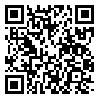Volume 32, Issue 2 (Spring 2024)
Avicenna J Nurs Midwifery Care 2024, 32(2): 150-161 |
Back to browse issues page
Ethics code: IR.NKUMS.REC.1401.019
Download citation:
BibTeX | RIS | EndNote | Medlars | ProCite | Reference Manager | RefWorks
Send citation to:



BibTeX | RIS | EndNote | Medlars | ProCite | Reference Manager | RefWorks
Send citation to:
Mafinezhad S, Rashidi Fakari F, Talebzadeh M, Namdar Ahmadabad H, Bayani G. Investigating the Factors Related to the Acceptance of the Covid-19 Vaccine by the Parents of Children Aged 5 to 12 Years. Avicenna J Nurs Midwifery Care 2024; 32 (2) :150-161
URL: http://nmj.umsha.ac.ir/article-1-2611-en.html
URL: http://nmj.umsha.ac.ir/article-1-2611-en.html
Shahin Mafinezhad1 

 , Farzaneh Rashidi Fakari2
, Farzaneh Rashidi Fakari2 
 , Mohsen Talebzadeh3
, Mohsen Talebzadeh3 
 , Hasan Namdar Ahmadabad *4
, Hasan Namdar Ahmadabad *4 

 , Ghasem Bayani1
, Ghasem Bayani1 




 , Farzaneh Rashidi Fakari2
, Farzaneh Rashidi Fakari2 
 , Mohsen Talebzadeh3
, Mohsen Talebzadeh3 
 , Hasan Namdar Ahmadabad *4
, Hasan Namdar Ahmadabad *4 

 , Ghasem Bayani1
, Ghasem Bayani1 


1- Department of Pediatrics, School of Medicine, North Khorasan University of Medical Sciences, Bojnurd, Iran
2- Department of Midwifery, School of Medicine, North Khorasan University of Medical Sciences, Bojnurd, Iran
3- Student Research Committee, School of Medicine, North Khorasan University of Medical Sciences, Bojnurd, Iran
4- Vector-borne Diseases Research Center, North Khorasan University of Medical Sciences, Bojnurd, Iran & Department of Pathobiology and Laboratory Sciences, North Khorasan University of Medical Sciences, Bojnurd, Iran ,namdar360@gmail.com
2- Department of Midwifery, School of Medicine, North Khorasan University of Medical Sciences, Bojnurd, Iran
3- Student Research Committee, School of Medicine, North Khorasan University of Medical Sciences, Bojnurd, Iran
4- Vector-borne Diseases Research Center, North Khorasan University of Medical Sciences, Bojnurd, Iran & Department of Pathobiology and Laboratory Sciences, North Khorasan University of Medical Sciences, Bojnurd, Iran ,
Abstract: (3463 Views)
Background and Objective: In the present study, the factors related to the acceptance of the COVID-19 vaccine by the parents of children aged 5-12 years were investigated.
Materials and Methods: This web-based cross-sectional descriptive study was conducted on 340 parents of children aged 5-12 in Bojnord City in 2022. The data collection tool included the demographic profile form and the attitude and awareness form about the COVID-19 vaccine for children. The data were analyzed by descriptive statistics, chi-squared, and independent t-tests.
Results: More than 60% of parents did not want to vaccinate their children against COVID-19. Most parents declared the danger of the vaccine as their most important concern (45.9%). Besides, most parents evaluated their knowledge and awareness about the COVID-19 disease and its vaccine at an average level (57.4%). There was no significant relationship between the level of knowledge and awareness of parents and their acceptance of the COVID-19 vaccine (P<0.05). There was a significant relationship between the indicators of gender, age, education, and especially the level of trust in the health and treatment system with the willingness of parents to vaccinate their children (P<0.05).
Conclusion: It seems that concern about the safety of COVID-19 vaccines for children and lack of trust in the healthcare system are among the main reasons for the undesirable acceptance of the vaccine by parents. Public health interventions should focus on the improvement of the trust of people in the healthcare system and also the implementation of educational campaigns to address demographic factors that contribute to vaccine hesitancy.
Materials and Methods: This web-based cross-sectional descriptive study was conducted on 340 parents of children aged 5-12 in Bojnord City in 2022. The data collection tool included the demographic profile form and the attitude and awareness form about the COVID-19 vaccine for children. The data were analyzed by descriptive statistics, chi-squared, and independent t-tests.
Results: More than 60% of parents did not want to vaccinate their children against COVID-19. Most parents declared the danger of the vaccine as their most important concern (45.9%). Besides, most parents evaluated their knowledge and awareness about the COVID-19 disease and its vaccine at an average level (57.4%). There was no significant relationship between the level of knowledge and awareness of parents and their acceptance of the COVID-19 vaccine (P<0.05). There was a significant relationship between the indicators of gender, age, education, and especially the level of trust in the health and treatment system with the willingness of parents to vaccinate their children (P<0.05).
Conclusion: It seems that concern about the safety of COVID-19 vaccines for children and lack of trust in the healthcare system are among the main reasons for the undesirable acceptance of the vaccine by parents. Public health interventions should focus on the improvement of the trust of people in the healthcare system and also the implementation of educational campaigns to address demographic factors that contribute to vaccine hesitancy.
Type of Study: Original Research |
Subject:
Self-care in chronic diseases
Received: 2023/02/19 | Accepted: 2023/08/20 | Published: 2024/06/15
Received: 2023/02/19 | Accepted: 2023/08/20 | Published: 2024/06/15
Send email to the article author
| Rights and permissions | |
 |
This work is licensed under a Creative Commons Attribution-NonCommercial 4.0 International License. |




 gmail.com
gmail.com